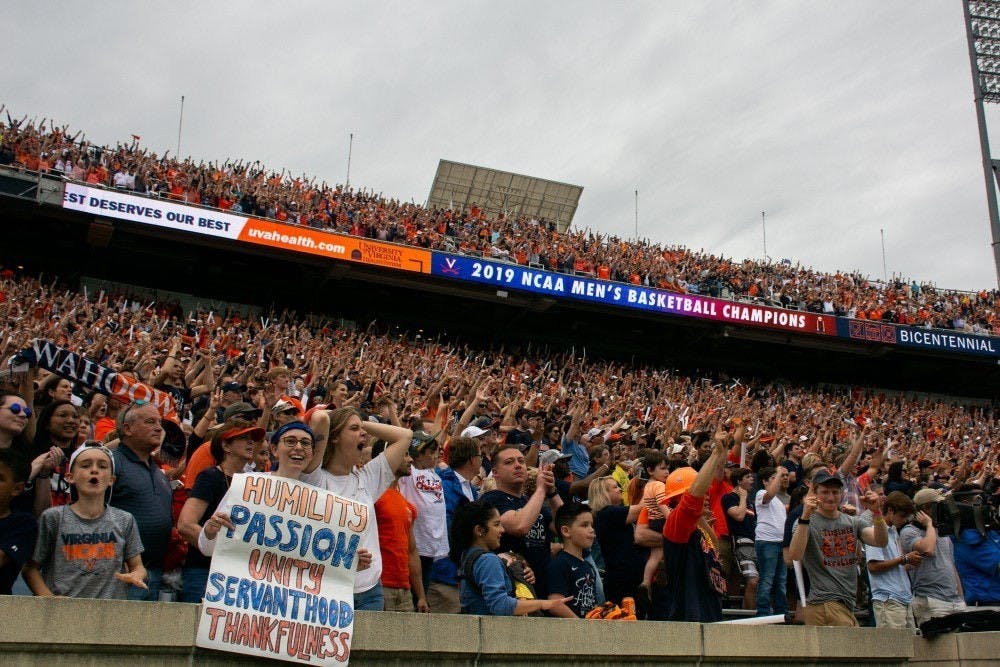Just when we thought that the COVID-19 pandemic had finished stripping our lives of any remaining normalcy, it proved us wrong. The Atlantic Coast Conference announced March 12 that the Georgia Tech vs. Virginia ACC Tournament semifinal game had been canceled. This devastating decision was prompted by a single positive coronavirus test found within the Virginia men’s basketball program. This cancellation should only serve as a reminder to the student body that the COVID-19 pandemic is not over — we must remember to act responsibly.
In a press conference March 14, coach Tony Bennett assured fans that the program would continue testing daily and complying with the National Collegiate Athletic Association’s protocols. Bennett revealed that contact tracing has left most of the team in quarantine, where they will stay until Thursday. Until then, no team practices can be held. Virginia will compete in the NCAA men’s basketball tournament —the team is scheduled to travel to Indianapolis for on Friday prior to their first game on Saturday. Dan Gavitt, NCAA Senior Vice President of Men’s Basketball, notes that only five healthy players are needed to participate in an NCAA tournament game. Two negative tests must be presented 12 hours apart before a game can commence.
However, this does not diminish the fact that the anticipated ACC championship title was ripped from their grasp. Not only this but the entire meaning of the 2021 ACC men’s basketball championship title changed. No longer would the winner be a product of pure athleticism but of who could outlast the coronavirus spread — as both Georgia Tech and Florida State advanced to the finals due to semi final cancellations. Granted any team that can make it to the ACC semifinal game showcases extreme dedication. Still, ACC protocol gives some teams an unfair advantage — despite however necessary these measures are to ensure the safety of our community. Students and fans alike are rightfully frustrated with not being able to see their team succeed — though no blame should be placed on any individual — and it is a reminder that coronavirus precautions must be taken seriously.
Athletic excellence has always been a substantial part of the culture at the University. Men’s basketball has connected students at the University in a way in which academics simply don’t. This program is a symbol of the University’s undeniable success in the collegiate realm. Whether it be winning the legendary NCAA championship game in 2019 or the banter of being defending NCAA champions a year later, the men’s basketball program has proven to be irreplaceable. In 2021, a full year into the coronavirus pandemic, we still find ourselves unable to obtain the fruits which men’s basketball bears. Despite countless protocols, tedious testing schedules and thorough contact tracing, COVID-19 has poisoned the fruits of men’s basketball at the University.
This crippling realization should not be taken lightly. We are not in this position by chance. We cannot be surprised that over 2,000 students at the University have already contracted the virus. The combined ignorance and passive action of large masses of the student body are what got us here. The blatant disregard for the safety and wellbeing of our fellow classmates and of the greater Charlottesville community is what got us here. What started with reckless Midsummer parties in the summer turned into bar hopping weekends in the fall, leading to coronavirus-ridden IFC events in the spring. We must learn from our mistakes and not use March Madness as an excuse to celebrate irresponsibly. Battling the coronavirus pandemic is a constant, conscious effort that must improve if we are to regain any sense of normalcy in the future. It is the responsibility of each student to continue getting tested, taking necessary precautions and following the guidelines laid out by our administration.
I have heard so many students yearn for a regular college experience. I understand and share your sadness, frustration or anger — especially after the news of our men’s basketball team. However, nothing will change unless we collectively face this issue and work proactively to leave COVID-19 in the past. No blame can be put on one individual — rather as adults we must collectively take responsibility for what has happened. Complaining about a lost ACC Championship is only valid when you start to take the coronavirus pandemic seriously.
Men’s basketball took a hit this year. In order to ensure a path towards normalcy, it is imperative that the student body heeds all coronavirus guidelines as implemented by our administration. Only then can we fully regain the fruits of men’s basketball and fully celebrate their future hopeful NCAA championship win.
Grace Duregger is a Viewpoint Writer for The Cavalier Daily. She can be reached at opinion@cavalierdaily.com.
The opinions expressed in this column are not necessarily those of The Cavalier Daily. Columns represent the views of the authors alone.







